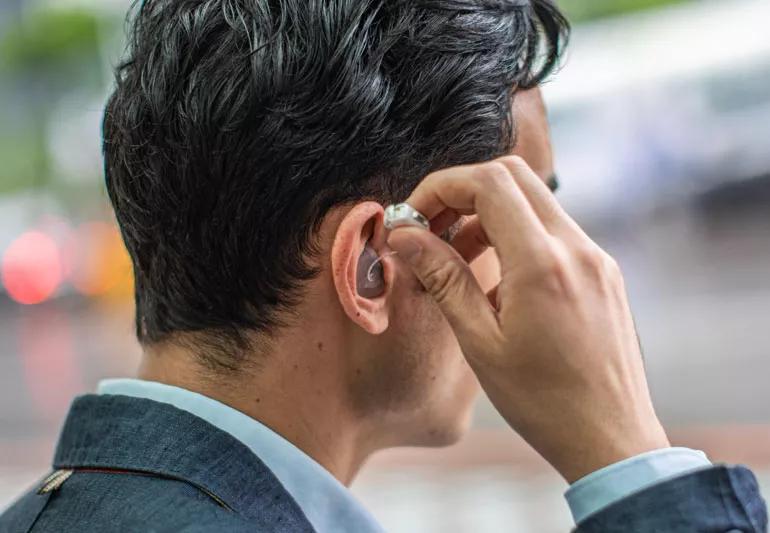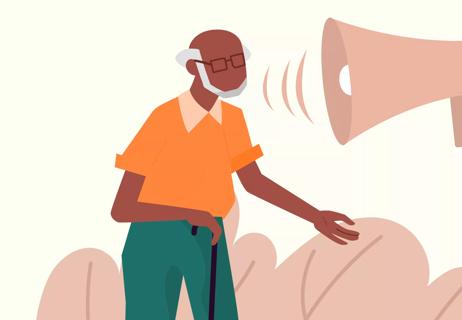Learn how to help encourage a better quality of life

Why is it so common for someone who is having a hard time hearing to wait to take action to improve their hearing? It seems that they must know they can’t follow along with the conversation at a crowded dinner table. They often ask you to repeat yourself (and you try not to yell!) And the volume on the TV? Yikes.
Advertisement
Cleveland Clinic is a non-profit academic medical center. Advertising on our site helps support our mission. We do not endorse non-Cleveland Clinic products or services. Policy
But, in fact, audiologist Sarah Sydlowski, AudD, PhD, says delaying or resisting help for hearing loss is very real ― and more common than you might think. Here, she helps provide talking points to refute some of the most reasons she encounters most often:
Dr. Sydlowski: Audiologists hear this one a lot. And in reality, there’s a little bit of truth to this!
Most of us are moving about in our busy lives and often don’t always use the best communication techniques – especially at home with family members. Turning your head, chewing food or walking away from a person while speaking are things we all do, but can make hearing a conversation very difficult.
So has someone’s family all of a sudden started mumbling? Probably not. When we have normal hearing, we may miss out on a word here or there in a conversation. But we’ll get the gist of what’s being said.
When we have a hearing loss, we’ll often miss more than just a word here or there ― especially if there’s background noise (like a TV on or water running). We can often figure out what was said if only a word or two is missed. But with hearing loss, often several words (or even whole sentences) are missed or misunderstood.
This can cause miscommunication and often hurt feelings among family members. The reality is that most people are not able to reliably detect if they have hearing loss or how much, simply because if you don’t hear something, you won’t know that you missed it. Or if you mishear words, you often won’t realize you did so. Friends, family, and colleagues are usually aware of a possible hearing loss long before the person with hearing loss notices.
Advertisement
So be an advocate for your loved ones, friends and colleagues. If you are concerned they are not hearing as well as they used to, mention it to them and encourage them to have their hearing checked. Remind them you want to be able to have good conversations with them long into the future.
Dr. Sydlowski: Audiologists actually fit hearing aids for people of any age, from very young babies to adults.
Now that hospitals use Universal Newborn Hearing Screening, we’re able to identify hearing loss earlier than ever before and fit hearing aids on babies as young as a few weeks to a few months old. But hearing loss can occur at any age.
And hearing devices are better than ever before. The technology available in today’s hearing aids provides such advanced features as the ability to wirelessly connect a Smartphone to the hearing device or stream audio from Bluetooth-enabled devices, taking the place of wireless earbuds. Some hearing aids are starting to incorporate other high-tech personal assistant features (like in-ear language translation) and other wellness support (falls detection, blood pressure monitoring).
Hearing aid manufacturers realize that today’s hearing aid wearers often have very active lifestyles and have provided very small, discreet looking aids that look great and perform even better.
So, no, hearing aids aren’t for old people. Today’s hearing aids are for people of all ages who want to hear better and live life to the fullest!
Dr. Sydlowski: You don’t need to have a lot of hearing loss to find that not being able to hear clearly can cause a lot of frustration. Even those with a mild hearing loss may find that they have difficulty hearing quiet speech, hearing someone speaking from a distance, or being able to communicate in a noisy restaurant.
The harder you have to work to hear and communicate, the less energy you have for everything else you need to do. There is also new research emerging suggesting that there is a relationship between untreated hearing loss and eventual cognitive decline, even in cases of mild hearing loss.
If hearing loss is negatively affecting a loved one’s life, gently encourage them that it’s time to schedule an appointment with an audiologist to have their hearing checked.
The bottom line? There are many options available to help people with any degree of hearing loss – from mild to profound. An audiologist can review these options to see which would be the best fit for you.
Dr. Sydlowski: This is one of the most common misconceptions. In fact, hearing devices are available at a variety of price points that may be appropriate to meet an individual’s needs. Although Medicare Part B still doesn’t cover hearing aids, they do cover hearing tests, and many insurers (including Medicare Advantage plans) are starting to include some hearing aid benefits. Additionally, some hearing aids intended for people with mild-to-moderate loss will be available over-the-counter.
Advertisement
However, the best step you can take to hear better is to have your hearing checked by an audiologist. Your audiologist can then talk with you about which devices would be most appropriate for your needs and your budget. Don’t assume that cost would prevent you from improving your quality of life! Take the first (usually covered) step, and have your hearing checked!
Advertisement
Learn more about our editorial process.
Advertisement

Sudden hearing loss can have many causes — but it’s important to seek treatment fast

Hearing aids can be enough for some people, but other devices — like for your phone, TV and fire alarm — can help, too

Untreated hearing loss can affect kids’ speech and language development and their overall quality of life

Reduce background noise, don’t talk too fast or too slow and above all, ask what’s most helpful to them

Ringing is already a sign of damage, but you can take steps to keep your hearing protected

Keeping your brain healthy is key

Damage accumulates over time

Routine screenings at school are normal and important

The tropical fruit is a good source of antioxidants and vitamin C

Most people fall asleep within 10 to 20 minutes, but if your experience is different, adjusting your sleep schedule may help

Exploring your hidden side can lead to better understanding of what makes you tick